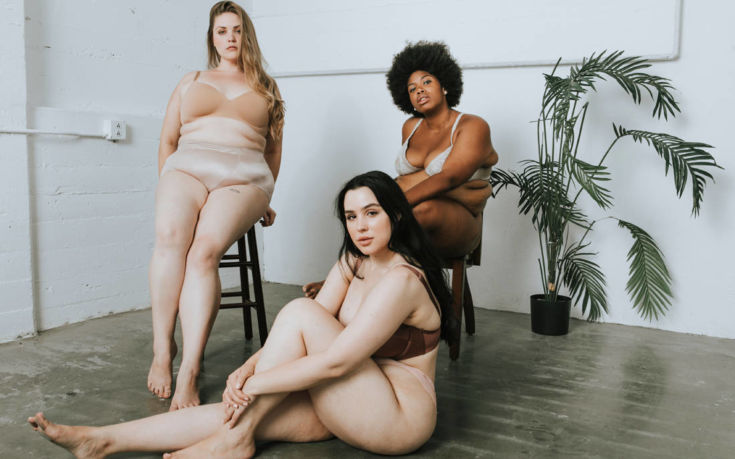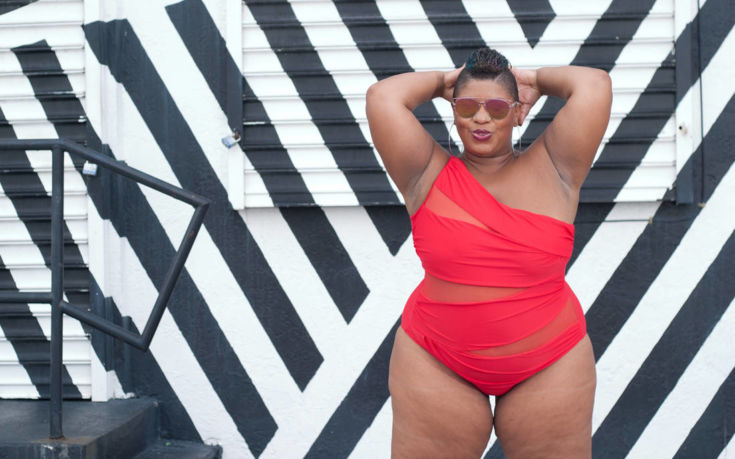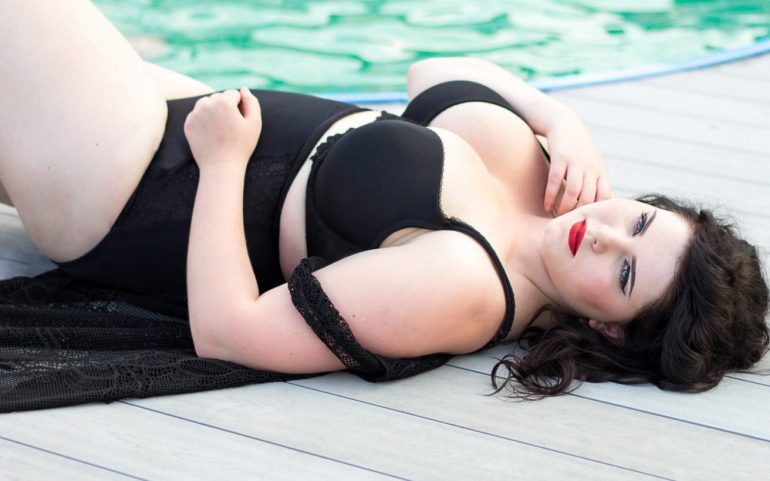The success stories of the overweight models usually start from Instagram. Beautiful women, with beautiful faces and over or much extra pounds, decide to pose for the camera loving their body that some criticize badly. Usually, a clothing company or an advertising company discovers them and the career in photography begins. The amounts they make are not negligible at all.
Fashion through the promotion of "XL" models promotes obesity, some argue, challenging the new "movement". But they forget the problems that a person may face due to the non-social acceptance of extra pounds. The educational, counseling psychologist, Dr. Kalliopi Emmanouilidou, spoke to newsbeast.gr about "fat shaming".
- What is so-called fat shaming? At what ages does an expert observe it and how does it relate to the standards of magazines?
"Fat shaming" is the act of embarrassing a person because of his or her alleged overweight. The word shaming is also used for other descriptions of people, such as "slut shaming", ie the provocation of feelings of shame in women, with the subject of alleged sexually provocative behavior.
Fat shaming can be caused at any age by people of all ages. From the little kid who someone tells him "you became a snob, do not eat any more cake" to a big lady who someone says "you are very fat".
The models come not only from fashion magazines, but also from the clothing, advertising, aesthetics, cosmetics, but also music, film and television industries, which are interconnected and benefit from the promotion of a strict beauty model. , in which (apart from other physical characteristics) the body weight is particularly low. To these I will add the food industries that push overconsumption and contribute to obesity, which in turn feeds the (extremely lucrative) slimming industries, trapping modern western man in vicious circles…
The overweight model who was criticized as no woman for her weight

The 33-year-old Tessa Holiday, mother of one child was found last season, posing on the cover of "Cosmopolitan". She announced her photo shoot on social media with great joy, it was an elusive dream for her.
"If I had seen this cover when I was younger, things would have been very different in my life," he said. In interviews with many media outlets, she had mentioned, among other things, how badly she had experienced racism and guilt with the pounds: "There was a time when I was driving in the car with my child inside and I thought that there really is no reason for me to exist…" .
Many criticized the magazine. And especially the British journalist Piers Morgan. Projecting an oversized model is exactly the same as projecting a woman with anorexia as a model of beauty, they said.
- How far can the effects of being ashamed of one's thickness go? How much do people suffer today? Can they even develop psychological "pathologies"?
We see normal people who do not have a problem weight, but feel ashamed of their body, just because the abdomen does the normal "side" when they sit. This shame can indeed reach psychopathological levels, with the result that a person becomes obsessed with his "thick" points, constantly trying to hide or eliminate them, to control the reflection of his image wherever he is (in windows, mirrors). , shop windows!) with severe anxiety. This anxiety about self-image is unfortunately a very common phenomenon that can even lead to eating disorders, such as the extremely dangerous disease of anorexia, in which the person goes so far as to distort his self-image and feel a pathological phobia of obesity. even if it is bony.
- Many complain about the photos of companies and campaigns, saying that the unhealthy lifestyle is promoted…
In my psychotherapeutic experience I have come across cases of particularly thin people who suffer just as much as those who are overweight, due to the comments they receive. In the range of human bodies we meet all kinds of people with all kinds of shapes, heights, colors, hair growth, skins, etc. The use of a model e.g. Does freckles mean we force all people to have freckles? Or that our society must learn to accept diversity?
But beyond that (that inclusion also means imposing a standard) we need to raise some more questions: how much exaggeration can we support? Anything that goes beyond the strict and very weak standard, is it pathological? Isn't it very unhealthy to have an overly slim body? Why do we always need to talk about two extremes and not support all the other intermediate body states?

- Is the fact that you can be healthy despite being overweight?
Body mass index is a measurement constructed with very dubious methodologies, reasoning and motivation. Today, science is trying to find other health indicators, taking into account research that has found that body weight is not a necessary prognostic factor for health problems, compared to other factors. Of course it depends on how many kilos are, it is not scientifically correct to make generalizations.
Is a lean body necessary and healthy if the person lives with stress and / or consumes substances and / or has a poor diet and / or does not exercise? Each case is different, because there may be a correlation between high weight and specific health problems, but this does not exclude the case of an overweight (in a reasonable context, without extremes that the human body can not support) to be healthy.
Men do not need to have belly slices
Thirty-year-old Zach Miko is considered one of the first men with extra pounds who was involved in fashion. He has a beautiful face but no belly slices and puffy arms. The American, an actor by profession, could never have imagined that he could be involved in fashion: "It was as unlikely for me as to become Queen Elizabeth of England, he had stated in an interview with a well-known American magazine.
Why do women receive more critical comments about obesity than men?
Racism with the physical image may have been more combined with the case of women, but it also happens very often with men. As Dr. explains to us. Emmanouilidou:
"This is an obvious manifestation of patriarchal social ties, which manipulate the female sex by trapping it in narrowly defined patterns of appearance, with socio-economic motives. A woman who feels bad about her body will constantly try to "fix" it, spending money for the benefit of the slimming, fashion and beauty industries that cause a sense of inadequacy and ugliness for their profit. And spending time and money instead of devoting it to her education or career. In recent years, of course, industries have been promoting incredible beauty standards for men as well, with the result that the overweight or obese man has been the subject of commentary and embarrassment, but to a much lesser extent than women. Men are not required to be beautiful in the same way and to the same degree as women.
The change of mentality in the fashion industry
The fashion industry seems to be changing for the better. It may take some time to convince us. Nike is one of the companies that recently decided to launch the collection with its oversized sportswear. Calvin Klein, after Kendall Jenner, suddenly placed in her campaign the young rapper Chika to promote her overweight beautiful body with the slogan: #I speak my truth with my calvins. Some argued that she simply wanted to raise her prestige and relive the old great glories, following the trends of the time.
- Are the intentions of the fashion industry in general sincere, beyond these cases? She has created many bad stereotypes in the past and the covers always work with the sexualization of the female body. Does it have an effect on the change of mentality?
I can not generalize easily. It depends on the campaign rather. Sexualization can be done vulgarly, reducing a woman as a human being through objectification, or it can be done in a way that empowers the female sex, emphasizing the right to sexuality. However, anything that puts forward "commands" and imposes standards in an aggressive way plants doubt in me. If we look at it raw, the fashion industry is about profit and not social change. When, for example, a company decides to make a series of fair trade clothes, but most of the clothes are produced in third world factories where child labor is allowed, we should not be influenced by a series or a campaign individually but look at the big picture and make ethical decisions as consumers. .
- Fashion promotes self-confidence through coquettishness many times. How can he really feel confident and well with his body and free himself from social stereotypes in everyday life?
Without wanting to conspire, it is an extremely liberating experience for a person when he realizes what is really going on. That this is a well-made game of enrichment at the expense of the sense of inadequacy created by sacrificing human self-confidence.
In my own psychotherapeutic methodology as an antidote to this social (and often family) poison, the notion of self-compassion, self-love without criticism, and the realistic acceptance of our wonderful imperfection is reinforced. We are beautifully imperfect and of course many other amazing things, beyond our image!
